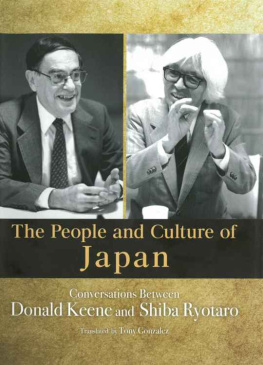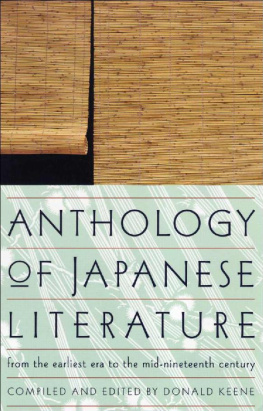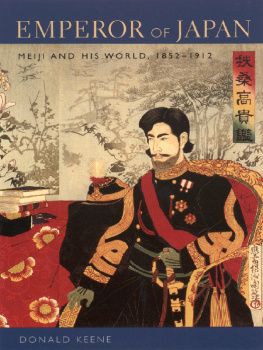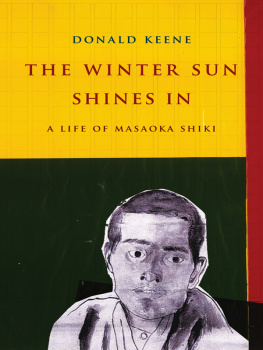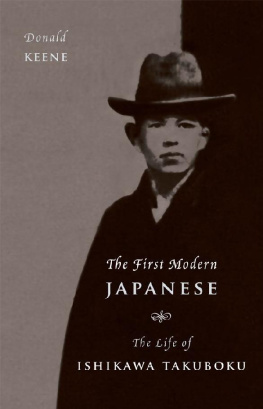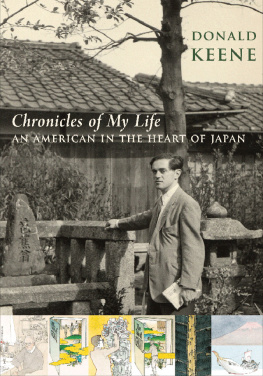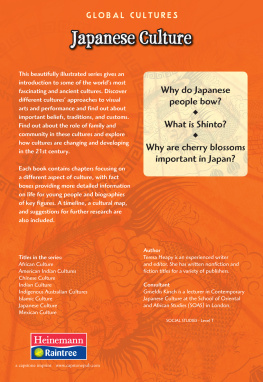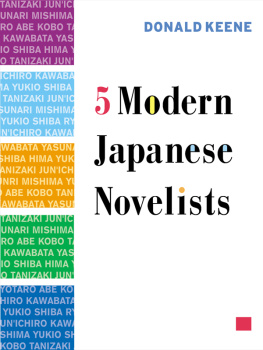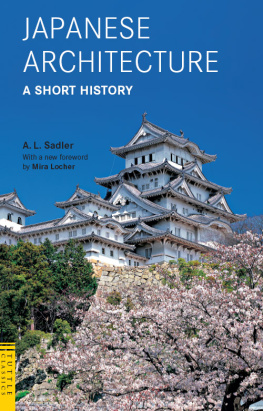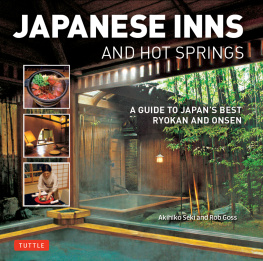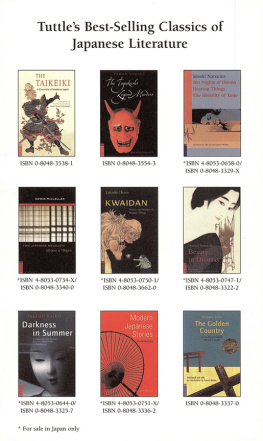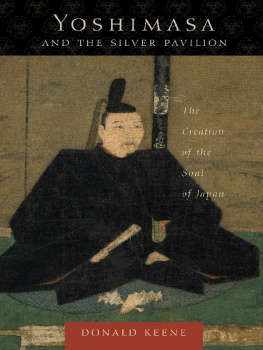


Note on Japanese names
All Japanese names appearing in this book are given in Japanese order, with family name first.
The People and Culture of Japan: Conversations Between Donald Keene and Shiba Ryotaro
Donald Keene and Shiba Ryotaro. Translated by Tony Gonzalez.
Published by Japan Publishing Industry Foundation for Culture (JPIC), 3-12-3 Kanda-Jinbocho, Chiyoda-ku, Tokyo 101-0051, Japan
1972, 2013 by Donald Keene, Uemura Yoko and Shiba Ryotaro Memorial Foundation
English translation 2016 by Japan Publishing Industry Foundation for Culture
All rights reserved.
This book is a complete translation of Nihonjin to nihonbunka from the Collected Works of Donald Keene, Vol. 9; Donarudo kiin chosakushu dai 9 kan: sekai no naka no nihonbunka (Shinchosha Publishing Co., Ltd., 2013), which is also in print since its original publication in 1972 as a book published by CHUOKORON-SHINSHA, Inc. Its contents comprise three conversations held in 1971, respectively at the Nara Hotel, the Ginkakuji temple in Kyoto, and the Tekijuku Academy in Osaka.
Cover design: Niizuma Hisanori
Cover photo Umehara Shoichi
http://www.jpic.or.jp/japanlibrary/
The People and Culture of Japan: Conversations Between Donald Keene and Shiba Ryotaro
20163

101-0051 3-12-3
03-5211-7282
http://www.jpic.or.jp/
1972, 2013 by Donald Keene, Uemura Yoko and Shiba Ryotaro Memorial Foundation
Foreword to the English Edition
The following dialogues took place in 1971, and were first published in Japanese in 1972. Over forty years have passed since then, yet they seem as pertinent today as they did back then. Indeed, they provoke quiet reflection upon the fundamental origins of Japan in this time of troubles.
This year marks the twentieth anniversary of Shibas passing. In this milestone year, we look forward to the English translation of these dialogues as a new opportunity for many people to come to better know Japan. Shiba Ryotaro devoted his life to consideration of Japan and its people, so Im sure that he would have been equally thrilled.
Uemura Yoko
Director
Shiba Ryotaro Memorial Foundation
February, 2016
Preface to the English Edition
My share of The People and Culture of Japan began with a telephone call from an editor who informed me of a crisis. Shiba Ryotaro, the most popular writer in Japan, had agreed to participate in a dialogue for his magazine, but the scholar who was scheduled to be Shibas counterpart in the dialogue had been stricken with illness. The editor asked if I would serve as his substitute. My first response was to refuse on the grounds that I had not read Shibas books and felt unqualified to engage in a dialogue with him. The editor called again, this time to say that Shiba had requested that I not read his books. This unexpected, rather humorous command changed my mind and I gladly accepted.
Shiba made one requesthe asked that the place of our conversations not be outside the Kansai region. He lived near Osaka and for this reason might not have wished to travel far from home. Or perhaps he had already conceived the dialogue in terms of how one section of the country had reflected the different epochs of Japanese history. In any case, our meetings took place in Nara, Kyoto, and Osaka.
We met at the site of the Heijo palace in Nara, the earliest capital of Japan. The ruins were scant and not very suggestive of the remains of a castle, but that evening, during our conversation in the hotel, Shiba revealed that the ruins had evoked in him the dawn of Japanese civilization. He articulated with such eloquence what Japan must have been like in ancient times that I thought I would have nothing to add. That night, after our dialogue had ended, I could not recall having said anything to Shiba. It was only after reading the proofs that it became apparent that Shiba had in fact asked questions that he knew would interest me. Nervousness had made me think I had said hardly a word, but he had actually enabled me to say quite a lot.
The second dialogue was at Ginkakuji temple in Kyoto. It just so happened that it took place on a cold winter night. Special permission had been obtained to keep the buildings open after the usual closing time. Shiba, however, was sensitive to the cold, and as soon as the necessary photographs were taken we hurried out of Ginkakuji and headed for a heated restaurant.
The third was the dialogue I enjoyed most. Shiba and I walked together along Midosuji avenue in Osaka, stopping at monuments that were related to Matsuo Basho who had died nearby. We ate dinner at a restaurant, said to be several hundred years old, where we shared tables with other people in the old style. I no longer felt the tension that had hovered over me during the two preceding meetings and we talked like old friends. We would remain friends from then until his sudden death.
I have one fault to find with this book. I believe that Shiba was overly kind and generous in what he wrote about me. I am not a genius, nor am I the best scholar of Japanese literature. I am grateful for the friendship revealed in such words of praise, but I have become too modest a Japanese to accept them.
Donald Keene
September, 2015
Table of Contents
Preface
If I were forced to define my relationship with Donald Keene, then despite our shared experience of war taking place on opposite sides of an ocean, I would have to call him a comrade-in-arms. I unfortunately remain unsure as to exactly what meaning the war held for me, but there is one thing I know: were it not for that war, the world of Japanese culture would have been lessened by never having acquired the genius of Donald Keene.
My first meeting with Keene was one of varied strange impressions. Despite his already being old enough to be graying at the temples, I had never before met an individual whose appearance as a youth I could so easily reconstruct in my mind. He had delicate eyelashes like the down on a baby bird, and below that, eyes always ready to sparkle with childlike curiosity. He seemed to have a flame burning inside that immediately distilled the tidbits captured by his inquisitive and sensitive intellect into purer truths. That flame, which has burned like an eternal votive candle, first lit in the dim light of a New York subway when Keene was a student, peering at a notebook of Japanese characters hed collected and wondering about their odd attraction and the culture that lay beyond them. War dragged that youth toward a fate of Japanese language studies. Without the war, he never would have ended up performing the task of applying universality to that unique corner of humanity known as Japanese culture.
It was my fate to be born Japanese. My birth was registered in the city hall of a Japanese town, and by virtue of this alone I became part of the nation called Japan. From this I have deluded myself into thinking that I know something about the country. Many other Japanese people no doubt share the same delusion, and Im sure that, like myself, they are startled from time to time when confronted with their misapprehension. The source of such disquiet is frequently a work by Donald Keene.

